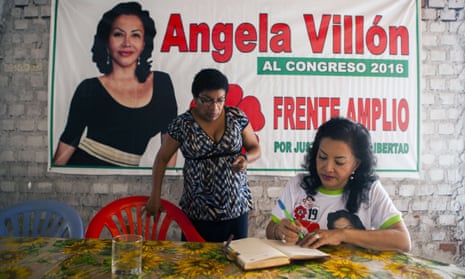Dressed in a close-fitting black dress and sparkly high heels, Angela Villón cuts a different figure from other congressional hopefuls as she hands out flyers on the street in Lima.
Villón, 51, is the first sex worker in the country to run for congress.
“Never before has someone from a vulnerable population like mine been a representative in Peru’s congress,” she says. “It would be historic.”
Villón is running for El Frente Amplio, a coalition of leftist parties and movements, in Peru’s general and legislative elections in April. She is one of more than 2,600 candidates for 130 seats in Peru’s legislative chamber.
After a morning on the campaign trail Villón, an activist for sex workers’ rights for more than 20 years, heads to work in Callao, Lima’s port district. People stop and stare as she climbs into a taxi outside a shopping mall and says: “Take me to the place.” It is code for El Botecito, one of the port’s biggest and oldest brothels; more than 100 women work there.
The taxi turns off the road near a university and drives through a huge car park filled with lorries, where the brothel looms into view. Women in lingerie are standing in the doorways to their rooms, which line a long corridor illuminated by red light as cumbia music throbs in the background. On the door of Villón’s room is a large photo of her in a bath, with a sign that reads: “Angela Villón Bustamante: Sex Professional”.
She likes her job. “I feel proud to be a prostitute because it’s synonymous with freedom,” she says, lying on the bed in the room she rents for 25 Peruvian soles a night (about £5). Being insulted because of what she does for a living is the last thing that worries her about the electoral campaign, she says.
“People say if you go with more than one man, you’re a whore; if you wear loose clothing you’re a whore; if you’re sexy or sassy you’re a whore … so whether I’m a prostitute or not, whether I do it for free or not, I’d still be called a whore. So I’m a super whore and I’m super happy.”
Villón has just returned to the profession after a hiatus of nearly 20 years in which she led Miluska Vida y Dignidad, the first organisation to push for labour rights and respect for sex workers in Peru, which she founded in 1999. Sex work is legal in Peru but street-walking and procuring sex are not.
She established the organisation after being severely beaten by a police officer when she refused to pay protection money.
“I pressed charges,” Villón says. “My colleagues said to me, ‘Whores can’t do that – only respectable people.’ I said, ‘Well, I’m a respectable whore.’”The police officer was charged and jailed, which set a precedent. “We knew then that we didn’t have to accept everyday violence, that we didn’t have to think we deserved it,” she says.
After campaigning for the rights of people who are HIV positive, and for legal recognition for fellow sex workers, she has now set her sights on parliament because, she says, she was tired of “having the door shut” in her face.
“Many people think sex workers are ignorant and do the job because all they know is how to open their legs, well … this prostitute knows how to express herself, has clear ideas and I’m going to put order in that big brothel which is congress.”
Opinion polls indicate congress is consistently Peru’s most discredited institution. According to an Ipsos Apoyo poll in September 2015, 84% of Peruvians said they didn’t trust the country’s parliament.
If elected, Villón, who is a mother of four, has vowed to legislate to improve women’s rights, decriminalise abortion in the case of rape, back civil unions and gay marriage, and fight human trafficking and the sexual exploitation of underage girls.
After falling pregnant at 16 and finding herself on the street, Villón began sex work to pay for medicine for her sick child, she says. She had previously tried to earn a living as a domestic worker, a street vendor and a nanny.
“I took a decision in a moment of crisis, but the crisis passed and I continued because I feel comfortable doing this job. I’m not a victim,” she says. She feels her colleagues today are more empowered.
She would also continue her fight for the recognition and protection of sex workers, which would help combat trafficking, she says: the industry preys disproportionately on vulnerable indigenous women and girls. According to the global slavery index, an estimated 66,300 people were in modern slavery in Peru in 2014.
“This society is cruel to women,” Villón says. “From when we are little girls we are taught to feel guilty and ashamed – that we are either saints or whores.”
She is not intimidated by the country’s poltical class. “I earned a masters on the street, a doctorate of experience. No one needs to tell me what it’s like to be hungry, to be poor, to be in need.”
Living that experience, she says, makes her closer to the people she hopes to represent.
